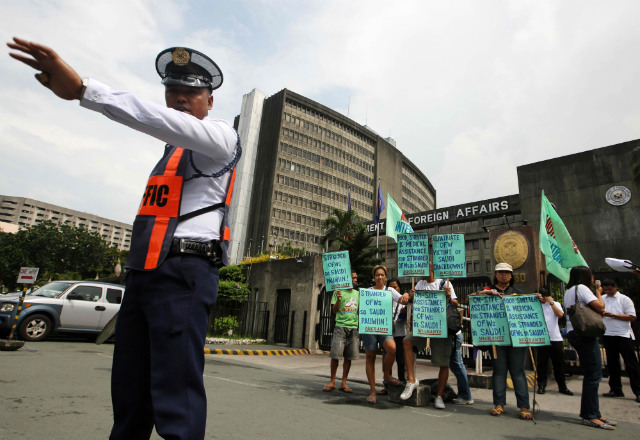SUMMARY
This is AI generated summarization, which may have errors. For context, always refer to the full article.

MANILA, Philippines – The Philippine government on Tuesday, November 5, blamed the “indecision” of illegal overseas Filipino workers (OFWs) after it failed to repatriate them before the deadline that Saudi Arabia set.
It also said the Saudi government’s sluggish process worsened the problem.
“I think that you can consider that the Philippine government has done everything possible to facilitate the repatriation of our people,” Foreign Secretary Albert del Rosario said in a press briefing.
“I think you have to say that it’s a process, and you have to undergo the whole process to be repatriated, and that’s what takes a long time. And contributing to the delay of the repatriation is the indecision of our own people,” Del Rosario said. (Watch more in the video below.)
The Philippines repatriated only around 4,420 illegal OFWs from Saudi Arabia in time for the deadline to legalize their status last Sunday, November 3.
That is only 49% of the 9,000 Filipinos who originally sought repatriation.
Del Rosario said that based on embassy estimates, 660,000 Filipinos live in Saudi. The number of undocumented workers remains uncertain.
Starting Sunday, illegal workers face up to two years in prison and fines of at least 100,000 riyal or $27,000.
‘What about our children?’
Del Rosario said Filipinos showed indecision in other repatriation efforts. These include the situation in strife-torn Libya and Syria.
“Filipinos do not make a quick decision,” he said.
This echoes a statement made by another foreign affairs official, Undersecretary Rafael Seguis, on repatriation efforts in Syria.
In an interview in September, Seguis said higher pay is one of the reasons Filipinos refuse to leave. (Watch more in the video below.)
He also said Filipinos in Syria felt uncertain about returning.
Seguis explained: “Sabi nila, ‘Ano pong gagawin namin pag-uwi namin? Mabuti kayo may trabaho. Kami, ano? Nag-aaral ang mga anak namin, nasa kolehiyo. Sinong gagastos sa kanila?’”
(They say, “What will we do when we return? Good for you, you have a job. What about us? We send our children to school; they’re now in college. Who will shoulder their expenses?”)
Slow process
Del Rosario added that in Saudi, another problem is “the speed at which people were being processed.”
“It was not a quick process. When we went to this center which was issuing exit visas for our people, it was really surprising to see that the services there were not quite up to par,” Del Rosario said.
“But I believe that we had registered the necessary request to operate that. I don’t know to what extent it had been upgraded,” he said. (Watch more in the video below.)
To describe the problem, in August, Del Rosario recounted a visit to a processing area in Jeddah, Saudi Arabia at around midnight.
It was the Muslim holy month of Ramadan, when the Saudi government designated 11 pm to 4 am as the hours to process papers from the Philippines as well as Bangladesh.
“I noted that there was only one government official from Saudi that was handling the processing of several hundreds who were waiting to be able to get their exit visas. And so very promptly, the next morning, I wrote a letter to the foreign minister,” Del Rosario said in August.
Migrante, an overseas workers’ group, said it is concerned about around 6,700 stranded Filipino workers in Saudi after the deadline lapsed.
It blasted the Aquino administration for its failure to repatriate these workers.
The DFA, for its part, vowed to assist them even after November 3.
“We will try our best to help them in being able to pay the fines and penalties of our Filipinos who would like to be repatriated after the grace period,” DFA spokesman Raul Hernandez said in an earlier press briefing.
“That is exactly our mandate – to help everyone who would like to be repatriated or regularized,” he said. – Rappler.com
Add a comment
How does this make you feel?





There are no comments yet. Add your comment to start the conversation.